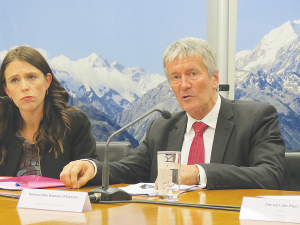NZ winegrowers advance vineyard biosecurity in 2025
The year was marked by “progress, collaboration and reflection” in biosecurity, says New Zealand Winegrowers Biosecurity Advisor Jim Herdman.
 Agriculture Minister Damien O’Connor and former PM Jacinda Ardern at the announcement of the M. Bovis eradication plan back in 2018.
Agriculture Minister Damien O’Connor and former PM Jacinda Ardern at the announcement of the M. Bovis eradication plan back in 2018.
Agriculture and Biosecurity Minister Damien O’Connor claims the success of the M. bovis eradication programme has saved NZ billions of dollars.
O’Connor told Rural News that effectively eradicating the disease is a world first.
He says when the Government and its key partners – MPI, DairyNZ and Beef+Lamb NZ – decided back in 2018 to eradicate rather than control the disease, many people in the world thought it was embarking on an impossible mission.
“But we have proved them wrong.”
As of now, the last known infected property in Mid- Canterbury has been destocked and declared disease-free, taking NZ to zero confirmed infections. O’Connor concedes it will be a few years before elimination can be confirmed. He says there have been brief periods in the past with no infections but with possible cases still being investigated.
“This is the first time we’ve had no cases and no investigations, but it will take five more years to really confirm the absence of M. bovis in our herds.”
O’Connor says getting to this point is the result of hard work, sacrifice and collaboration between MPI, DairyNZ and Beef+Lamb NZ with the support of farmers and their families whose herds have been infected.
“I acknowledge the hardship which affected farmers and families have felt during this time,” he says.
In the course of the five year eradication programme, almost 184,000 cattle have been culled, 280 farms depopulated and nearly 3000 farms subject to movement controls. The Government has paid out $247.6 million in compensation to affected farmers.
O’Connor says the overall cost of the eradication programme was in the order of $650 million dollars and was funded jointly by the industry bodies and government to do this.
“But the advice I had – and the observations we saw in NZ from the effects on mastitis, lameness, abortion and the requirement to wind back the intensity of our farm systems – it would have cost $1.3 billion in lost production in the first 10 years alone,” he claims. “It would have also required us to change farm systems if we had to farm with bovis.”
O’Connor says no one else in the world had done an eradication programme. The team running it had to constantly adjust, improve, adapt and learn as they went along. He adds that they had to develop new tracing systems, which led to the improvement of NAIT.
While there are no new cases of M. bovis, O’Connor admits they can’t say yet that they’ve reached eradication as we may still detect new cases in the future. He says there will be an on-going surveillance programme.
“But all the indicators – from the bulk milk testing to beef herd surveillance – give us confidence that the 10-year programme is working.”
Feds Pleased
Federated Farmers is describing the news as “marking a significant milestone” for eradicating M. bovis.
Feds president Wayne Langford says his organisation is cautiously optimistic that NZ has now turned a corner in the Mycoplasma bovis eradication efforts.
But he adds that they won’t be sure until bulk milk testing ramps up again in spring.
Langford says it’s been an incredibly challenging few years for the farming families whose animals have been infected and rural communities who have been anxious about the spread of the disease.
“There’s been a big financial cost to try and eradicate this disease, but there’s been a big emotional cost too,” he told Rural News.
“Farmers absolutely love their animals, so to lose your entire herd is just devastating. I hope those farmers who were impacted take real heart from the announcement and know it hasn’t all been for nothing.”
Langford says the job’s far from over, but all the indicators are pointing in the right direction.
Coming in at a year-end total at 3088 units, a rise of around 10% over the 2806 total for 2024, the signs are that the New Zealand farm machinery industry is turning the corner after a difficult couple of years.
New Zealand's animal health industry has a new tool addressing a long-standing sustainability issue.
The Government has announced that ACC will be a sponsor of this year's FMG Young Farmer of the Year competition.
As veterinary student numbers grow to help address New Zealand's national workforce shortge, Massey University's School of Veterinary Science is inviting more veterinary practices to partner in training the next generation of vets.
South Island dairy farmers will soon be able to supply organic milk to Fonterra.
Norwood has announced the opening of a new Tasman dealership at Richmond near Nelson next month.

OPINION: Meanwhile, red blooded Northland politician Matua Shane Jones has provided one of the most telling quotes of the year…
OPINION: This old mutt has been around for a few years now and it seems these ‘once in 100-year’ weather…